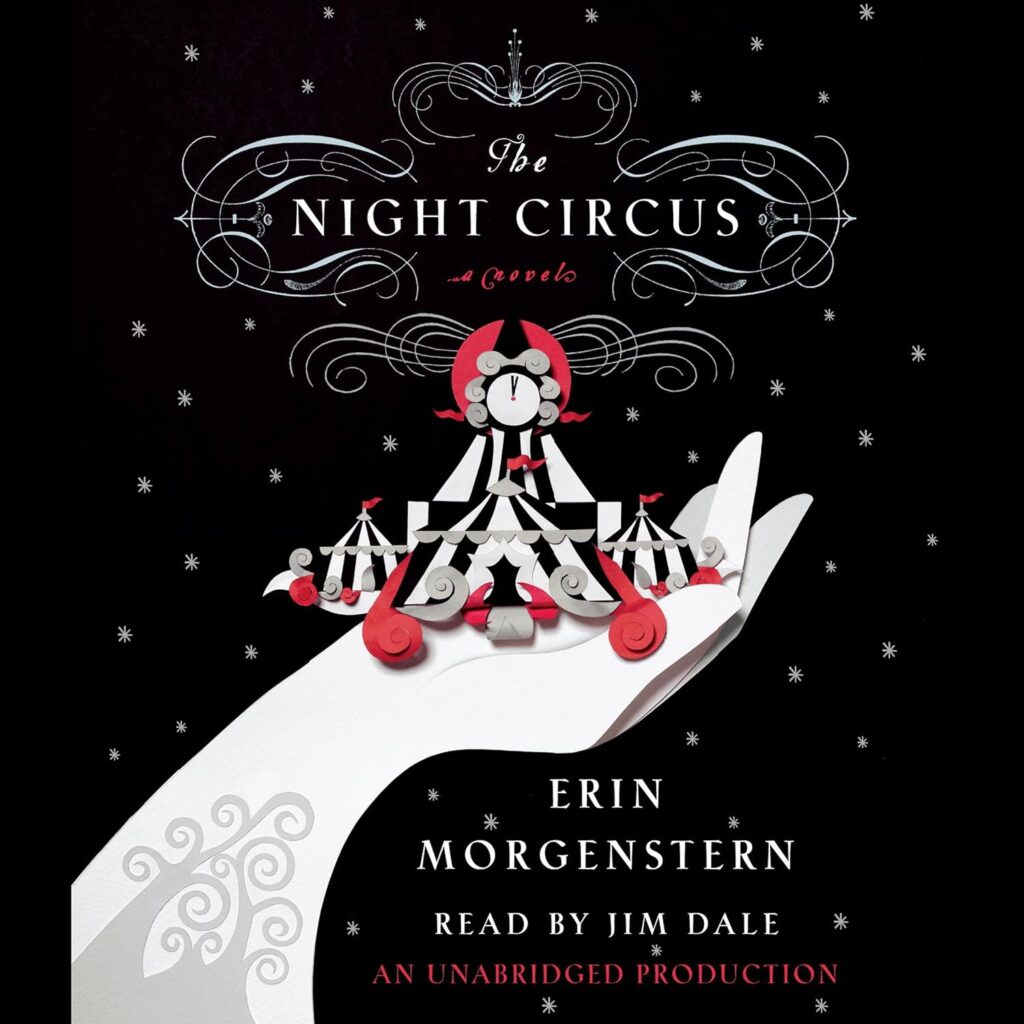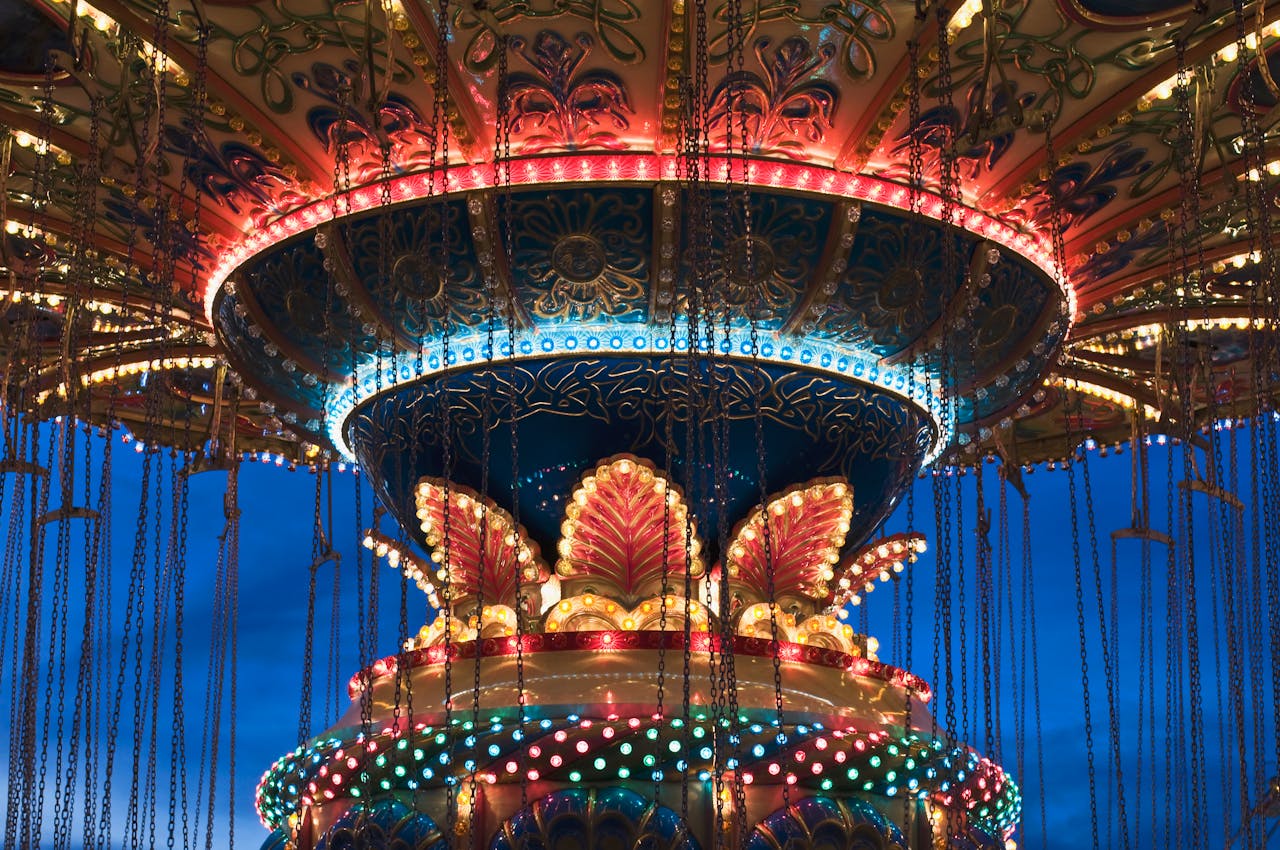Imagine a circus that appears without warning. No flyers, no announcements—just there one night, as if it sprouted from the earth itself. The tents are black and white, intricate and towering, filled with wonders beyond anything you could imagine. This is The Night Circus by Erin Morgenstern—a tale of magic, rivalry, and love that weaves a spell around you from the very first page.
It’s not just any circus. It’s the stage for an ancient, magical competition between two young illusionists who don’t fully understand the stakes of the game they’re playing. And the circus, well, it’s much more than a series of tents and performances. It’s a battleground, a wonderland, a prison, and a home—all at once.

1. The Circus That Comes and Goes Without Warning
The central and most captivating aspect of The Night Circus is, of course, the circus itself: Le Cirque des Rêves, or the Circus of Dreams. And dreams are exactly what it feels like. Imagine walking through towering black-and-white tents, each one more fantastic than the last. Inside, reality bends. You’ll find an ice garden where flowers and trees are carved from frozen water, a tent full of bottles containing captured scents and memories, and even a labyrinth of clouds. Every inch of the circus is full of enchantment.
But the circus doesn’t just exist for show. It’s a place of magic, created as a venue for a fierce competition between two illusionists, Celia and Marco. They were bound to this competition from a young age by their mentors, and the circus is their playing field.
1.1 The Game Begins: Celia vs. Marco
The magical rivalry between Celia Bowen and Marco Alisdair is the heart of the story. Celia, trained by her father, the cruel and controlling magician Prospero, has natural, raw talent. She can manipulate the physical world in extraordinary ways. Marco, on the other hand, has been trained by the mysterious Mr. A.H., who focuses on intellectual magic—spells drawn from books, careful study, and invisible power.
What makes their competition unique is that neither fully understands the rules. Both are told to create magical wonders, to stretch the limits of their abilities using the circus as their canvas. But there’s a dark side—they don’t know that their competition is a fight to the death. The game will only end when one of them is no longer able to compete. It’s a deadly game disguised as a beautiful dream.
1.2 The Circus as a Living, Breathing Entity
What makes the circus more than just a backdrop is that it feels alive. Every tent, every performer, every act is a result of either Celia or Marco’s magic. The circus is their battlefield, but it’s also a living extension of their souls. And yet, it becomes so much more. Over time, it takes on a life of its own, thanks in part to the performers and the people connected to it. The performers aren’t aware of the magical battle happening around them, but they become tied to the circus in ways that affect their fates.
The circus isn’t just a setting. It’s a character in its own right, shifting, changing, evolving as the story progresses. And like any character, it has its own secrets—some of which even Celia and Marco aren’t aware of.
1.3 The Clockmaker and the Dreamers
Alongside Celia and Marco, several secondary characters add layers to the novel. There’s the enigmatic clockmaker, Herr Thiessen, who builds an extraordinary clock that becomes a centerpiece of the circus. He’s also the leader of a group called the rêveurs—people who are obsessed with the circus, following it from place to place, completely captivated by its magic. The rêveurs are the heart of the circus’s audience, and through them, we see the deep emotional connection people develop with this strange, otherworldly place.
The clock itself is a symbol of the circus, intricate and impossible, marking time in a space where time seems to have no real meaning. Herr Thiessen’s work—and the rêveurs’ obsession—add a sense of wonder and mystery to the already enchanting world of The Night Circus.
2. The Romance That Defies the Rules
Celia and Marco are not just rivals; they’re also falling in love. And this love complicates everything. How can you be in a deadly competition with someone you care deeply about? Their relationship is beautifully written, filled with moments of quiet intensity rather than dramatic declarations. It feels forbidden, fragile, and yet somehow inevitable.
2.1 A Love Bound by Magic
As Celia and Marco grow to understand each other, their magic becomes intertwined. Each new wonder they create in the circus is a reflection of their growing connection. The circus, in a sense, becomes an expression of their love—full of beauty, danger, and the unknown. Their love adds complexity to the competition. They’re no longer just fighting to win; they’re trying to protect each other.
But here’s the twist: their love can’t break the rules of the game. They are still bound by their mentors and by the deadly nature of the competition. The deeper their feelings for each other, the more impossible their situation becomes. It’s tragic and beautiful at the same time.
2.2 The Conflict of Fate and Free Will
One of the themes that runs throughout The Night Circus is the tension between fate and free will. Celia and Marco were bound to this game without their consent, and their lives are controlled by forces beyond their understanding. And yet, they both yearn for freedom—for a way to break the chains of this deadly competition and be together.
The struggle between destiny and choice is something we can all relate to. How much of our lives are shaped by decisions we make, and how much is determined by forces outside of our control? This is one of the questions that The Night Circus explores, adding depth to the magical romance between Celia and Marco.
3. The Ending That Ties It All Together
Without giving too much away, the ending of The Night Circus brings the story full circle in a way that feels satisfying yet bittersweet. The resolution of the competition isn’t what you’d expect, and the fates of the characters are wrapped up in ways that leave you thinking about the story long after you’ve closed the book.
3.1 Sacrifice and the True Cost of Magic
One of the things that struck me most about The Night Circus is how it treats the idea of sacrifice. Throughout the book, we see that magic—true, powerful magic—comes with a cost. The performers in the circus, the rêveurs, even Celia and Marco themselves, all pay a price for the magic that surrounds them. It’s not always a physical price, but it’s there, lurking beneath the surface.
As the competition draws to a close, the idea of sacrifice becomes central to the story. What are Celia and Marco willing to give up for the circus, for their love, for their freedom? The answers are surprising and heartbreaking.
3.2 A Legacy Left Behind
At the end of the day, The Night Circus is about more than just a magical rivalry. It’s about the legacy we leave behind—the mark we make on the world. The circus, with all its wonder and mystery, becomes a symbol of that legacy. It’s a place where people come to dream, to escape, to experience something beyond the ordinary. And long after the competition is over, the circus continues to exist, a testament to the magic that created it.
3.3 What the Circus Teaches Us About Life
The circus may be a fantastical place, but it reflects real-life themes in many ways. It shows us that life is full of wonder, but also full of rules, consequences, and sometimes, heartache. It teaches us that the things we create—whether they’re magical tents, relationships, or memories—outlast us in ways we might not expect. And most importantly, it reminds us that the boundaries between reality and magic are often thinner than we think.
4. The Night Circus: A Dream You’ll Want to Return To
After experiencing the world of The Night Circus, it’s hard not to be enchanted by it. There’s something deeply personal about how it pulls you in, makes you wonder about the magic hidden in everyday life, and leaves you thinking about the choices we make, the people we meet, and the connections we form. It’s a book that doesn’t just tell a story; it wraps you up in a dream, one you don’t want to wake from.
So, now that you’ve heard about the wonders of Le Cirque des Rêves, let me ask you: If you could walk through its gates, what would you want to see? What magic would you hope to find under those black-and-white tents?
5. Related Articles
You may also find the following article helpful:
10 Best Cozy Fall Books to Read in 2024 for a Perfect Autumn




